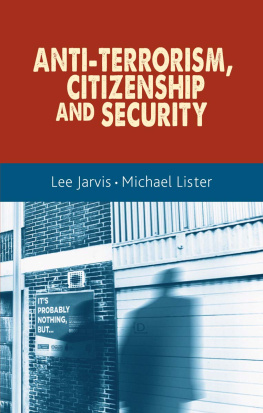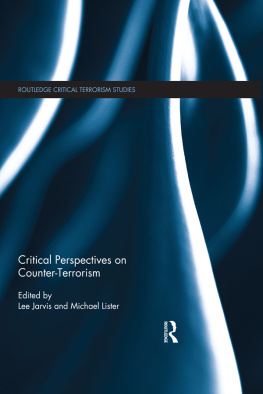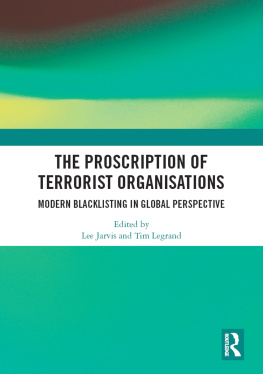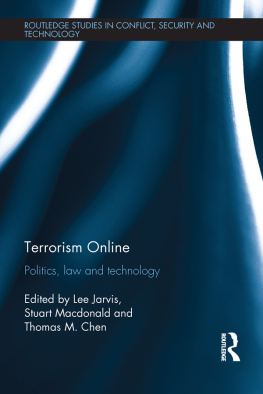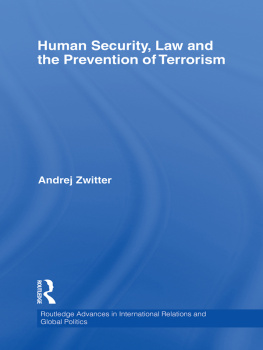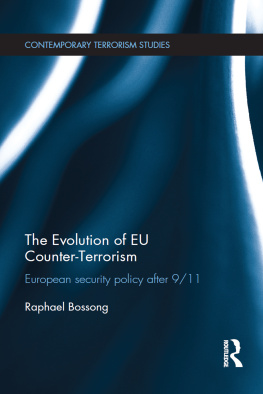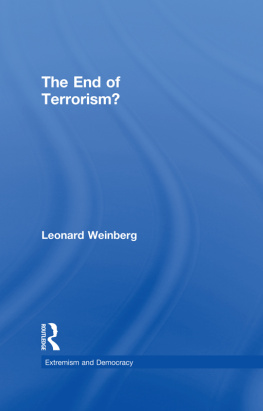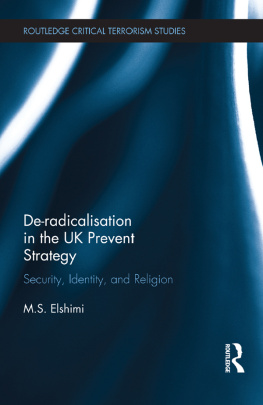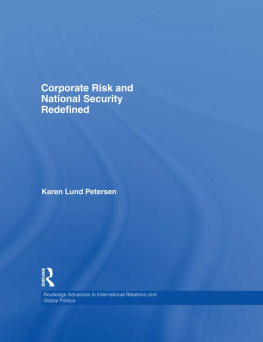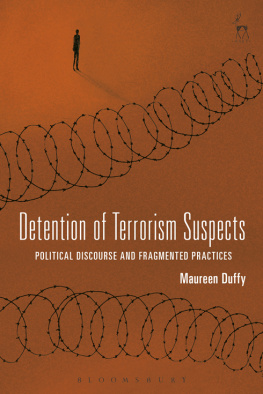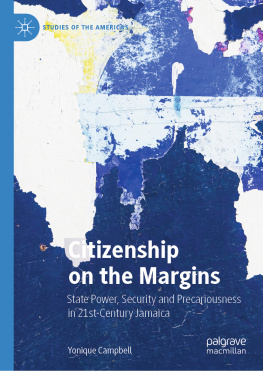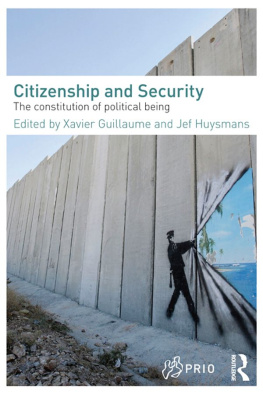Anti-terrorism, citizenship and security
Anti-terrorism, citizenship and security
Lee Jarvis and Michael Lister
Manchester University Press
Copyright Lee Jarvis and Michael Lister 2015
The rights of Lee Jarvis and Michael Lister to be identified as the authors of this work have been asserted by them in accordance with the Copyright, Designs and Patents Act 1988.
Published by Manchester University Press
Altrincham Street, Manchester M1 7JA
www.manchesteruniversitypress.co.uk
British Library Cataloguing-in-Publication Data
A catalogue record for this book is available from the British Library
Library of Congress Cataloging-in-Publication Data applied for
ISBN 978 0 7190 9159 9
First published 2015
The publisher has no responsibility for the persistence or accuracy of URLs for any external or third-party internet websites referred to in this book, and does not guarantee that any content on such websites is, or will remain, accurate or appropriate.
Typeset by JCS Publishing Services Ltd, www.jcs-publishing.co.uk
For Aya & Ami
and
Tamsin & Jessica
Contents
Acknowledgements
This book draws on material from an ESRC-funded research project that was initially conceived back in 2009. Over the course of the five years in which we have since worked on this project we have benefitted hugely from the help and assistance of a large number of individuals. We would like to take a moment here to acknowledge these and offer our sincere apologies to anyone we have omitted.
Firstly, we are particularly grateful to all of those people and organisations that arranged, hosted or participated in our focus groups. These included the African Community Centre in Swansea, Facilitators for a Better Jamaica in London and the Workers Educational Association in Llanelli, all of whom organised facilities as well as helping to recruit participants for our research. We are also deeply grateful to Parveen Akhtar, Justin Gest, Gauri Kaskbekar-Shah, Miriam Smith, Rukhsana Bibi, Alison Crotch-Harvey and Marie Wiswell for their time and help with this research.
In the process of working on ideas in this book, we have also benefitted from the advice, comments, feedback and other help of a large number of academics whom we gratefully acknowledge. Drafts of material contained here were presented at conferences, including events organised by the International Studies Association and the Political Studies Association, as well as in departmental events at Oxford Brookes University, Swansea University and the University of East Anglia. Our thanks go to our colleagues and friends in our current and former departments and to Richard Jackson, Matt McDonald, Ben OLoughlin, Basia Spalek and all those who attended our dissemination events in Swansea and London. Sections of the book were written during a sabbatical at the Department of Political Science in Copenhagen, for which we thank Lars Bo Kaspersen. We also gratefully acknowledge the Economic and Social Research Council for providing the funding for our research (RES 000-22-3765). At Manchester University Press we are indebted to Anthony Mason for his interest in and enthusiasm for the project, as well as for the patience he showed us throughout the writing of this book.
Some of the material contained in ) Vernacular Securities and their Study: A Qualitative Analysis and Future Research Agenda, International Relations 27(2): 157178. We gratefully acknowledge Wiley, Taylor and Francis, and Sage respectively for permission to reuse this material.
Finally, it is only appropriate that we thank our families and friends for all of the time, help and support they have given us in the course of this research. This book was written at a particularly eventful time in our personal lives, and we simply could not have completed it without the support of our partners, Tamsin Barber and Aya Oyama. We hope, too, that our parents, siblings and friends know how grateful we are all for their encouragement over the years: thank you.
Introduction
Few issues have attracted as much discussion in recent years as that of terrorist violence and how it should be countered. Attacks from 9/11, through to events in Bali, Madrid, London, Mumbai, Woolwich and beyond have ensured that the former is never far from the headlines. Sustained and enormous military commitments in Afghanistan and Iraq, prisoner abuse scandals, high-profile assassinations, the restructuring of security bureaucracies, vast financial expenditure and much else besides have served similarly to keep the latter at the forefront of political debate. Within the UK, but beyond this as well, a concerted attempt to uprate and enhance existing anti-terrorism), it is difficult to argue that little has changed in this policy context in the years that have now passed since those attacks.
Innovations such as these have not passed without controversy. Advocates of still more muscular anti-terrorism initiatives have tended to invoke a need to revisit the always-precarious balance between liberty and security in times of extreme national duress (for example, Meisels ) have pointed, in contrast, to the pernicious implications of such measures for fundamental principles of democratic life, decrying those agitating for their sacrifice in a misguided quest for greater security.
Why citizenship? Why security?
For a book concerned with the development and experience of anti-terrorism powers in the UK since 9/11, raising the issue of why we focus on citizenship and security may seem unnecessary. It is tempting to suggest that the connection between anti-terrorism, citizenship and security is obvious. Whilst, to some extent, this is the case, their relations merit explicit exploration. In the first instance, anti-terrorism is, at some basic level, about enhancing the security of citizens: or, at least, this is how it is typically justified. In 2009, for example, then Prime Minister Gordon Brown stated: The first priority of any Government is to ensure the security and safety of the nation and all members of the public (HM Government : 6). Furthermore, the aforementioned balancing of liberty and security draws an implicit connection between the rights and freedoms citizens enjoy (and thus the formal content of citizenship) and the quality or level of security experienced. Taken together, these two points that the first duty of government is to protect, but that the freedoms citizenship entails create security challenges point to an ambivalent, and perhaps dichotomous, relationship between the two phenomena. It seems that citizenship may entail both a right to security but also a threat to security.
This point is picked up by Guillaume and Huysmans (: 3).
Guillaume and Huysmans also note that academic literature, and certainly Security Studies as a discipline, has shied away from examining these tensions, preferring instead to focus either on the security of states (and not citizens) ) have sought to address this lacuna. This volume complements this work with an empirical probing of how citizens themselves think about these phenomena and their relations in the context of anti-terrorism. We thus aim to consider the impact upon citizenship of the UK governments attempts to provide security from terrorism. And we aim to examine the extent to which faith in citizenship and its protections underpins a sense of security from the force of (anti-)terrorism.

